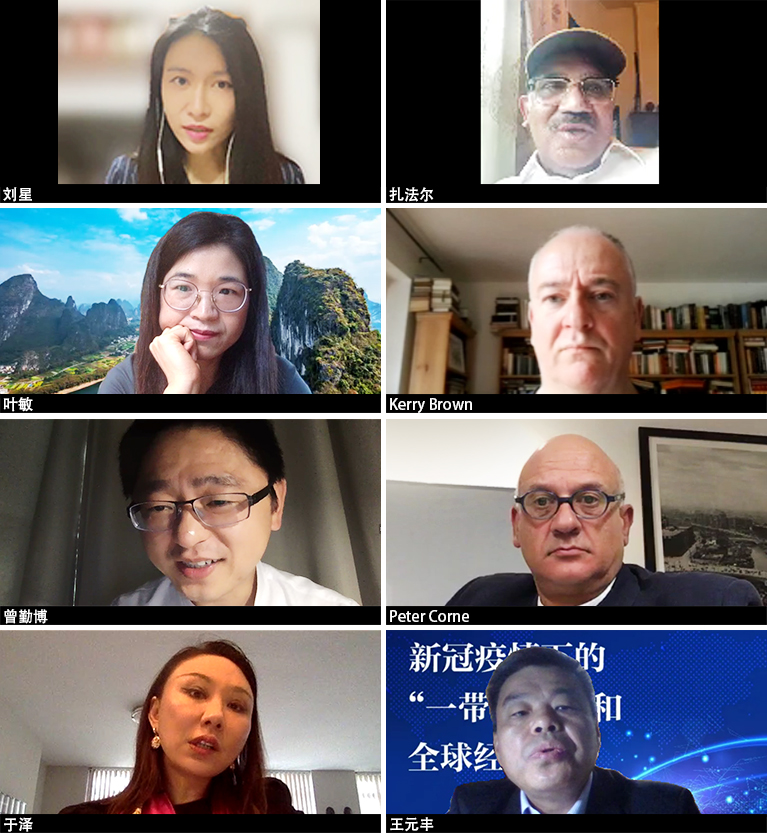On the evening of April 29, 2020, the International Financial Forum (IFF) and the Silk Road International Association (SRIA) jointly convened the IFF 2020 Fifth Webinar: Belt and Road Initiative and the Global Economy amidst the COVID-19 Pandemic. Min Ye, associate professor of international relations of Boston university, Kerry Brown, professor of Chinese studies and director of Lau China Institute, Bob Tseng, managing partner of Thanlwin Legal, Peter Corne, partner of Dorsey & Whitney LLP and Shirley Yu, Asia fellow with the Ash Center of Harvard Kennedy School were invited to explore the epidemic’s impacts to the BRI and the Initiative’s development after the outbreak. Liu Xing, chief editor of China Central Television (CCTV) programme Dialogue chaired the meeting. Zafaruddin Mahmood, co-secretary general of International Finance Forum (IFF) and Silk Road International Association (SRIA) and former special envoy of China-Pakistan Economic Corridor delivered a welcomeremark, and Wang Yuanfeng, executive director of the IFF Institute, vice chairman of Chinese Association of Development Strategy Studies and professor of Beijing Jiaotong University commented and summarized the presentations in the end. Nearly 100 guests from China, the United States, the United Kingdom and Pakistan attended the meeting.

Min Ye, associate professor of international relations of Boston University, gave a presentation titled "Rhetoric versus reality: The origins, implementation and trajectory of the Belt and Road" and provided suggestions on how China should adjust the initiative in the post-virus era. She believed the BRI was originally proposed to meet the needs of China’s economic growth and globalization. The outbreak will neither bring an end to China's embrace of globalization nor the BRI. Despite the challenges, the pandemic has presented some opportunities for the BRI to be improved. Ye suggested the crisis caused by the epidemic be turned into improvement of the BRI through re-branding, problem solving and real professional consultancy.
Kerry Brown, professor of Chinese studies and director of the Lau China Institute talked from both historical and political perspectives about how Europe made of the BRI before the pandemic. With uncertainties in China’s relationships with the BRI countries after the outbreak, China should strengthen its communication and exchanges with European countries.
Bob Tseng, managing partner of Thanlwin Legal analyzed how the pandemic would affect the BRI in Myanmar from three aspects: the BRI’s development in Myanmar, the epidemic’s influence on BRI projects in Myanmar, and the three domains for China’s investment in Myanmar that would be affected by the pandemic. He believed that the changes in the global landscape need to be considered for the BRI development because these changes could affect the planning of the BRI.
Peter Corne, partner of Dorsey & Whitney LLP, analyzed the contractual problems and the associated legal and cultural challenges arising out of force majeure events along the BRI and provided solutions. Although enterprises can resort to force majeure to reduce their losses derived from the pandemic, they could still find it too time-consuming and expensive to trigger force majeure clauses in arbitration because the definition of force majeure varies in countries’ law. He suggested that for enterprises to cope with force majeure events, they should make the most of the traditional Chinese culture of Confucianism and Daoism and therefore resort to international commercial mediation, which would both help reduce the loss of enterprises and maintain good relations with BRI countries.
Shirley Yu, Asia fellow of Ash Center of Harvard Kennedy School talked about the different anti-epidemic measures and economic relief plans between the West and China and the changes in the world economy due to the epidemic. She also elaborated how the BRI 1.0 had evolved into BRI 2.0. After the outbreak, technology would be vital in re-shaping the BRI, and the new infrastructure plans would bring new development opportunities to China and the BRI regions. Considering how science and technology had changed the world pattern, democracy systems and world peace since the industrial revolutions, Yu pointed out that science and technology would be the most significant force in re-shaping the future world. Besides, she explained how 5G and other emerging technologies would influence the future of China and BRI countries especially Europe.
This webinar on the post-virus BRI is inspiring and constructive as always with many new insights, valuable information and advice. The experts discussed the BRI’s origins and its future in the post-epidemic period from a macro point of view. According to them, the BRI will be adjusted after the outbreak. As the global economy, societies and technologies become different, so will China and its relationship with the rest of the world.
For China, there will be both external and internal changes after the outbreak. The external changes include: First, globalization will not be the same as before as the COVID-19 reshapes the global supply chain, value chain, goods, capital, human resources etc. The outbreak will become a watershed in globalization; Second, many countries will alter their development goals. For instance, Myanmar’s focus will shift from conventional infrastructure and economic development before the outbreak to medical care and public health after the outbreak; Third, the future economy will become oriented to green and sustainable growth as the world’s economic and industrial patterns change; Fourth, science and technology along with the outbreak will change the world as the fourth industrial revolution takes place. For the first time in history, technologies including 5G, AI and IoT are mastered by developing countries such as China, which means the world's north-south divide that hasn’t been narrowed by previous industrial revolutions will be hopefully changed.
The experts believe that the dynamics in the China-US relationship will greatly influence the global political landscape, and that China's own development and future technologies will also reshape the world. China's response to the novel coronavirus disease is different from that of western countries. China's post-virus economic rescue and social policies would also influence the world. With both opportunities and challenges, more insights and strategies are needed for the BRI.
